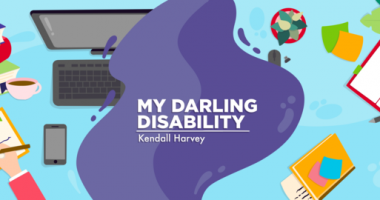Friedreich’s Ataxia Patient Spotlight: John Cernosek

Meet John Cernosek from Maryland! John lives in Silver Spring with his beautiful girlfriend, who also happens to have FA. He’s 34 years old and was diagnosed with Friedreich’s Ataxia at the age of 19. His responses to these questions were eye-opening and we enjoyed reading his perspective on life.
Frankie Perazzola: When you find yourself becoming depressed or sad, what do you do to make yourself feel better?
John Cernosek: Drink a beer. Write. Workout. Listen to music. Watch comedy. Read a book. Have a pity party. Take a ride through the streets. Or a combination of all these. This is pretty much what every day is like anyway. I’m always trying to make myself feel better.
FP: Do you practice meditation or any form of mindfulness? If so, why?
JC: I believe in it. I’ve been to a class in my building. It’s not so much part of my routine. I do breathing exercises, which is sort of a yes. I mostly do them to physically stretch my lungs. I also get stoned and zone out on a regular basis. I feel like having FA sort of forces mindfulness on us because we move slowly and deliberately, focusing on every little thing, which is sort of what mindfulness is.
MORE: Learn more about FA patient, Laura Wright
FP: What has been the most important lesson you have learned about life so far?
JC: Life is hard for everybody, without exception. I used to be bogged down with anxiety, thinking I was in everybody’s way all the time. Until I moved to a city. The pace was faster than I was used to and there were a lot more people. After a week of being here and feeling this way, I started to realize something: people don’t care about me and my problems. They care about themselves, and their own problems. If I’m in their way, they can go around me. Or they can wait. If they have a problem with other people existing in their space, well, they shouldn’t live in a city. They shouldn’t even visit a city. That’s their own personal problem and it is not on me to solve it.
Most people don’t have a problem with waiting a few extra seconds so I can do what I need to do. That realization has made a world of difference. I’m more relaxed. This makes me more pleasant. In turn, people are more pleasant to me. Interactions are smoother, generally speaking. Sure, there are people who don’t get it, but they are the exception and there’s nothing anyone can do about it. I’m heartened when people do get it, and treat me as an equal, or see that they should just go a different way, instead of making me feel like I’m imposing. So the lesson: people in the world don’t care about FA.
FP: Is there any advice you would give to someone who has just been diagnosed or is having a hard time dealing with their progression?
JC: Question everything. Never stop learning. Try your best. Help others when you can. Having FA does not mean that your life has to go a certain way; or that you have to feel a certain way. Fight for your autonomy.
MORE: Why patience is so important when you have FA
Friedreich’s Ataxia News is strictly a news and information website about the disease. It does not provide medical advice, diagnosis or treatment. This content is not intended to be a substitute for professional medical advice, diagnosis, or treatment. Always seek the advice of your physician or another qualified health provider with any questions you may have regarding a medical condition. Never disregard professional medical advice or delay in seeking it because of something you have read on this website.







